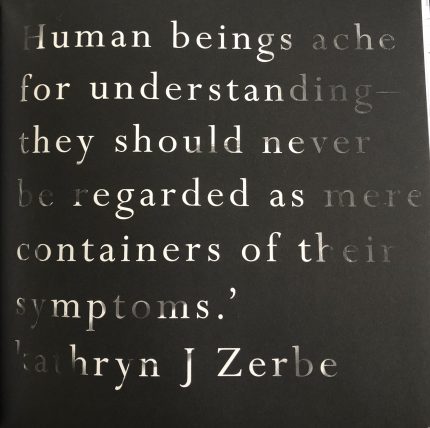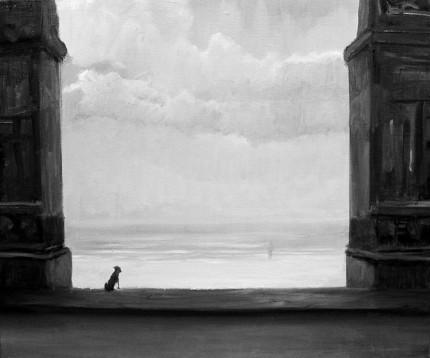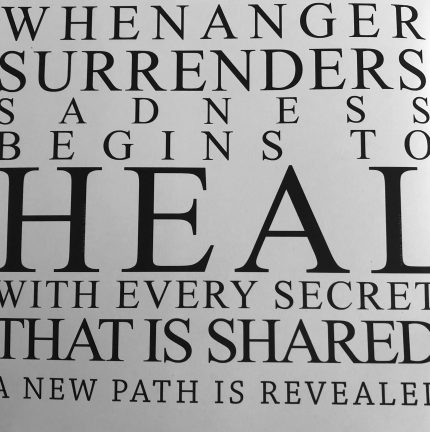Tread Carefully In Mind

(Reposted from 2008). You will Find Relief here.
In relation to the diagnosis of ‘depression’ and the feeling of being ‘depressed’ … I’m uncertain how much of what I’m experiencing are normal feelings and how much is due to a chemical imbalance in the brain? How much of how I’m feeling and experiencing is influenced by past trauma and bad experiences. Circumstance and environment? Belief and perception?While having a diagnosis of depression, anxiety disorder, PTSD and other conditions of mind can help make sense of things and provide a guide for treatment and medication (if necessary). Giving it significance beyond that can further darken our world. It can lead to the perception that, ‘something is wrong with us’. A perception by ourselves and others that we’re weak or flawed. And it can be the entry point into the isolation of social stigma and shame associated with ‘mental illness’.

(Art Harley Manifold, original in colour).
It has been helpful to separate myself from the diagnosis. To work out not, ‘what is wrong with me’, but ‘what’s not right’?
What remains are giant and often unmanageable feelings. A cocktail of emotion. Anger and rage in the mix with sadness, hopelessness and despair. Fear. Panic without a cause. Sensitivity or intolerance to light, noise, stress – people. The world around me. Places I can no longer go. Unrelenting critical head talk. Crippling self doubt. Dominant dark thoughts. Sometimes unbearably intense – other times, blunted. A feeling of nothing.
Add to this, the paralysing paranoia that can play out in my head as rewinds of past moments, dramas about what’s going to happen next; unrelenting ‘what will people think?’ thoughts. Then add in insomnia. Often the unmanageability of such a complex struggle can lead to seeking escape (and relief) in the form of substance abuse, self harm, addiction, over eating, excessive alcohol consumption. Alcohol and over eating is more socially acceptable than taking prescription mediation or seeking help from a health professional. It can also be a way of avoiding formalising there is ‘something wrong’ – or examining ‘what’s not right’. What needs our attention. Our time – and care.

There is a real danger in underestimating the seriousness of leaving conditions of mind uncared for and neglected. Of not seeking support and taking the time to ‘work on’ ‘what’s not going right’ for us.
But therapy also has a stigma. A social perception that something must be wrong with us if we ‘need help’. But what if we considered therapists and counsellors simply as ‘good listeners’. A ‘guide’. What if we could talk about how we’re feeling with someone listens and hears us, and helps us translate what we don’t understand or can’t put words to. Validate our struggle. Talking can be the opening, the entry point to working our way out. Feeling less alone and misunderstood in that process.
Talking about how we feel with someone we trust and who sits outside our immediate world and the people in it, can be vital to being able to see and work a way out. Listening is a skill and it can make all the difference to have one person who will listen and hear you. Who will ‘get you’. Who will come along side you and help you navigate your way through the struggles of life and mind.
Also vital is having someone close who you can be honest with and be supported by on a day to day basis. Watch for the signs of you not being in a good space.
Rather than putting up a fight against the struggle, sometimes accepting or surrendering to the struggle (not the same as giving up by the way) can also bring relief – and some time to work things out.
It’s ok to STOP. It’s ok to surrender for a while. It’s okay not to feel okay. It’s okay to take time to sort things out. It’s okay to put your hand up for help. It’s okay to retreat for a while. It’s okay to be the sensitive, vulnerable you right now and not be like everyone else. It’s okay to create and take the time and space to slow down and be really mindful about what’s going on in your head and life.
Do some quiet, achievable things that lift your mood. Which can be majorly difficult. Just getting out of the house can feel impossible. But pushing through that builds strength and resilience for the next time you may find yourself back where you feel you started.
And that’s not failure. It’s part of the cycle of things. Things come and go and come back again. Things also, in time, pass. The notion of endlessness can be strangely consoling because it’s the opposite to being stuck. There’s movement and possibility. And you gain a sense of trust and hopefulness from coming through and out the other side each time.
See also, You will Find Relief here. An Impossible Step. Heroic Friend. Slow Me Back To Small. ‘Dear Me’. Artwork from book, ‘In My Room’ (2007).
